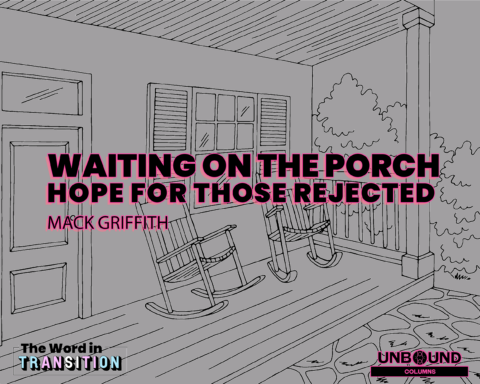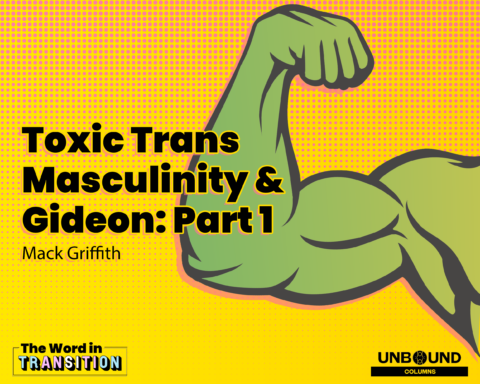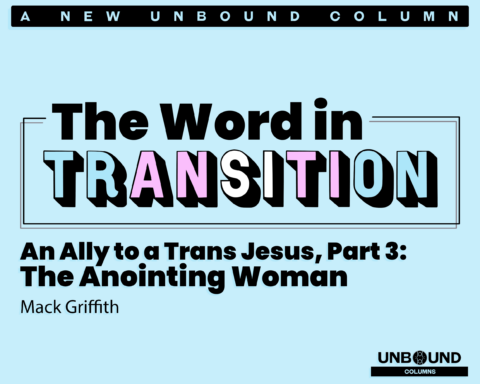In the first chapters of the Gideon narrative (Judges 6-7), an angel approaches Gideon while he is hiding in a wine press and informs him that God is calling him to be the judge and deliverer of Israel. As transgender people must grapple with disbelief, acceptance, and coming out, Gideon too doubts his calling, eventually accepts his identity, and comes out to his community. As Gideon prepares to face the Midianites in one of his first acts as judge, Gideon’s confidence inflates, and the reader begins to see the shift in Gideon’s character as his battle cry “For YHWH and for Gideon!” (7:18) places him on equal footing with YHWH.
In this section of the narrative and following, Gideon embraces his role as a warrior and deliverer. He knows the danger of taking the credit for victory away from the Lord, but when the time comes, the allure of power and prestige proves too strong. This is the moment when Gideon crosses from confidence to hubris paralleling a moment many transgender men experience when they cross from secure masculinity to toxic masculinity.
When a transgender man comes out and the world begins to recognize him as a man, societal expectations of masculinity and the pressure to conform can be overwhelming. In the face of transphobic societies where it is safer to fit into binary gender roles, trans men can find themselves working hard to embody what they and their communities see as a “proper man,” which can lead to toxic masculinity often manifested in being overly competitive, insisting on self-reliance, and needing to acquire and retain power. [1] Gideon demonstrates these traits in his claiming of credit for the defeat of the Midianites. While he does not outright say that he is the sole reason for the success, he takes credit where he is entitled to none. In modern society, this can take the form of “mansplaining” or condescendingly explaining concepts to women who likely already understand and are often more informed on the topic than the man. Trans men, in their pursuit of socially acceptable masculinity, may easily find themselves treating women and other non-men in their lives as inferior, falling into the beginnings of toxic masculinity. This often takes place in the LGBTQ+ community when white gay men speak over all other identities, when gay men regardless of race speak over transgender people, when white trans people speak over trans people of color, and when trans men regardless of race speak over trans women of color who are most at risk for discrimination and violence.
From the point of Gideon’s success against the Midianites onward, the toxicity and deadliness of his character only increase in intensity. Gideon’s actions through the end of chapter 7, with the exception of Gideon’s hubristic battle cry, are brutal but in line with the concept of Holy War.[2] After the success of the initial battle, however, “the cautious, timid Gideon of the fleece episode becomes zealous for his own reputation.”[3] Here, Gideon moves from mild hubris to violence.
As he is pursuing the kings of Midian, Gideon and his troops stop at Succoth and request provisions (8:4). When the people of Succoth refuse, Gideon threatens to “trample [their] flesh on the thorns of the wilderness and on briers” (8:7). He then goes on to Penuel and asks the people there for provision. He is again refused, and Gideon responds with another threat saying he will return and break down their tower (8:9). When he succeeds in capturing the two kings, Gideon returns to the cities and makes good on his threats (8:16-17). Gideon’s confidence turns fully to violent aggression. According to Biddle, “Whereas he repeatedly demanded evidence that God was with him, Gideon responds to the people from Succoth and Penuel, who desire evidence that he deserves their support, selfishly, peevishly, and viciously.”[4] This is the first instance of Gideon’s “externalized toxic masculinity,” when “men’s individual practice impacts on an individual and on society.”[5]
After exacting revenge on his fellow Israelites, Gideon then turns his egocentric violence against the captured kings, Zebah and Zalmunna. He asks the question, “What about the men whom you killed at Tabor?” (8:18). Biddle reads this question as a snide leading question because Gideon likely knows who the murdered men were and that they would have been left at Tabor.[6] The kings confirm what Gideon already knows and Gideon closes the trap, telling the kings that the men were his brothers and now he is going to kill them to avenge his family. According to Biddle, “on one hand, [the execution of the kings] solidifies the portrayal of Gideon as vengeful, petty, and increasingly egocentric. By his own admission (v. 19), he had not originally planned to execute the Midianite kings, but the conclusion that they have killed his full brothers motivates him to take personal revenge.”[7] Gideon’s need to exercise power over others increases to a fever pitch and after the kings mock Gideon’s masculinity having asked his son to kill them, Gideon executes them himself. Gideon’s masculinity cannot withstand mockery or perceived disrespect and his narcissism is solidified in the final verses of the cycle where Gideon refuses the title of king but creates an ephod, a sacred cultic item, and names his son Abimelech, “my father is king.”
The Gideon cycle in Judges 6-8 ends with a troubling legacy of violence, vengeance, and hubris. Niditch reads Gideon’s long life as a marker of a truly blessed man who served God and Abimelech’s villainy of chapter 9 as the foil to Gideon’s godliness; however, Biddle argues that Abimelech is merely the concentration of Gideon’s worst character traits.[8] Gideon’s oldest son, Jether, who does not demonstrate “proper masculinity” when he is unable or unwilling to kill (v. 20), drops out of the narrative while Abimelech, becomes the focus of the next cycle embodying his father’s ruthlessness and egocentrism until he is met with a violent death. Through his own toxic masculinity, Gideon leaves a legacy which will cut one son out of the narrative and teach another to be just a cruel as his father. Gideon is often thought of, as seen in Niditch, as a godly man and a paragon of humility before God. Often, the only story highlighted is Gideon’s initial success against the Midianites and he is applauded for his reliance on God rather than his own strength. However, as Biddle notes, “As a unit, the Gideon cycle depicts a complex figure, not a hero famed for one feat. Indeed, rabbinic tradition, noting these features of the story, considered Gideon one of the three “least worthy” of the judges along with Jephthah and Samson.”[9]
Transgender men can easily be categorized by a singular event in our lives which can lead to similar oversights as those who read Gideon in light of only his initial successes. Trans men are often categorized based on their bravery in coming out and transitioning and while we are men, there is often the belief that we are still fundamentally different from cisgender men because we understand the discrimination and victimization leveled against people assigned female at birth. We are considered a different kind of men who cannot contribute to the oppression of women because we have an understanding of that oppression that cisgender men will never have. However, just as Gideon’s character is more complex than a single trait, the masculinity of trans men is also more complex. As Gideon is not devoid of oppressive traits as the deliverer of Israel, trans men are not immediately free of misogyny or toxic masculinity.
When trans men come out, there is often insecurity in one’s masculinity and the intense awareness of the dangers of toxic masculinity that prompts trans men to be more conscious of themselves and their attitudes toward others. However, trans men who choose to transition often achieve more confidence in their masculinity as they begin to pass as male in public and consequently experience male privilege for the first time. Not unlike Gideon’s initial success with pulling down the alter of Baal and defeating the Midianites, this is the point where over-confidence and the beginnings of toxic masculinity can emerge.
If a trans man does not check his newfound privilege and does not develop healthy masculinity, he may attempt to over-compensate for his transness by leaning into toxically masculine stereotypes becoming aggressive, emotionally distant, and controlling. At first, he may police his own gender expression showing his internalized toxic masculinity, however, as he gains more power, as with Gideon, the internalized becomes externalized. This is the point where the oppressed becomes the oppressor and in the case of transgender men, this can take the form of abusing other less masculine trans people (non-binary people, feminine trans men, trans women) or cisgender women.
Gideon’s toxic traits did not only affect himself; he hurt his own people and even his children. Toxic masculinity is a cycle that is perpetuated by those who do not address their toxic traits and pressure others into adopting them as well. Abimelech inherited his father’s aggression and egocentrism and took it a step further by actively proclaiming himself king (Judges 9). Transgender men who have influence over other young trans men have the potential to shape how those men view masculinity and male privilege with the ability to break the cycle of toxicity or pass the toxicity on with the tools to exacerbate it further.
It is easy to read Gideon in light of the timid and humble man of Judges 6 who hid in the wine press, threw down the alter at night, and humbly requested sign after sign from the Lord. Such a reading allows the reader an underdog story of a humble hero who succeeds despite his insecurity. Unfortunately, to read Gideon through such a two-dimensional lens ignores the ruthlessly violent and self-centered man that he becomes and robs the reader of the opportunity to learn from Gideon’s mistakes. Other younger trans men will look to my generation of trans men to learn how to cultivate their masculinity. In those moments, we must choose to demonstrate healthy, non-oppressive, and humble masculinity. The “less masculine” men are watching for confirmation that they are valid and valued and the “more masculine” men need examples of how to remain humble even in a world that disproportionately values hyper-masculinity.
As a transgender man, reading Gideon through a transmasculine lens offers me the opportunity to find both encouragement in the coming out of Gideon as an insecure and hesitant hero as well as a warning in the aggressive and oppressive man he becomes. It is easy for me to think that my masculinity is free from toxicity and misogyny because of my transgender experiences, but the story of Gideon is a potent warning. Regardless of how one begins their journey, if one does not remain aware and critical of their actions and beliefs, anyone can go from oppressed to oppressor.
[1] Stephen M. Whitehead, Toxic Masculinity: Curing the Virus: Making Men Smarter, Healthier, Safer (Luton, Bedfordshire, UNITED KINGDOM: Andrews UK Ltd., 2019), 54, http://ebookcentral.proquest.com/lib/vand/detail.action?docID=6109088.
[2] Mark E. Biddle, Reading Judges: A Literary and Theological Commentary, Reading the Old Testament Series (Macon: Smyth & Helwys Pub, 2012), 92.
[3] Biddle, Reading Judges, 93.
[4] Biddle, Reading Judges, 95.
[5] Whitehead, Toxic Masculinity, 57–58.
[6] Biddle, Reading Judges, 96–97.
[7] Biddle, Reading Judges, 97.
[8] Biddle, Reading Judges, 99.
[9] Biddle, Reading Judges, 76; E. John Hamlin, At Risk in the Promised Land: A Commentary on the Book of Judges, International Theological Commentary (Grand Rapids: WBEerdmans, 1990), 90.

Mack Griffith (he/him/his) is transgender biblical scholar, poet, and 2021 Master of Theological Studies graduate of Vanderbilt Divinity School. After graduating from Vanderbilt Divinity School, he will go on to complete a Ph.D. in New Testament biblical studies through St. Mary’s University, Twickenham. Mack’s field of interest is transgender biblical studies, and he hopes to progress transgender biblical readings beyond defense of trans identities to readings that offer representation, hope, and empowerment to the transgender community.






Unbound Social